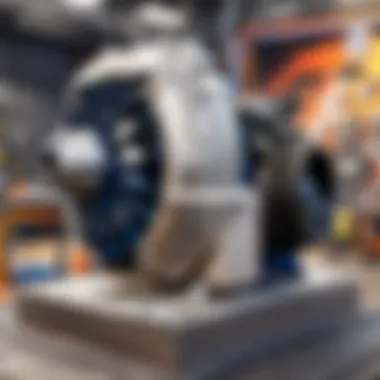Unraveling the Intricacies of Dyno Tuning Costs: A Comprehensive Guide


The Cost Factors of Dyno Tuning: A Comprehensive Analysis
In the realm of automotive performance optimization, dyno tuning stands as a cornerstone practice. This article endeavors to delve into the various cost factors intricately linked to dyno tuning, shedding light on its significance in enhancing vehicle performance and efficiency. By dissecting the basics of dyno tuning and examining the diverse components that play a pivotal role in determining pricing structures, readers will gain valuable insights into this essential process.
Understanding the Basics of Dyno Tuning
Before delving into the cost dynamics of dyno tuning, it's imperative to grasp the fundamental principles underlying this practice. Dyno tuning involves subjecting a vehicle to a dynamometer, a specialized tool that measures and evaluates its engine output. Through a series of diagnostic tests and adjustments, technicians can optimize various parameters such as fuel mixture, ignition timing, and airflow to enhance performance and efficiency.
Components Influencing Pricing
The cost of dyno tuning is not simply a fixed sum but a culmination of various factors that collectively determine the final price. One significant component influencing pricing is the type of dynamometer used for the tuning process. Different dynamometers, such as a chassis dyno or a hub dyno, come with varying price points based on their capabilities and precision.
Moreover, the complexity of the tuning required plays a pivotal role in shaping the overall cost. Vehicles with intricate engine systems or those needing extensive adjustments may incur higher expenses due to the additional time and expertise demanded for fine-tuning. Additionally, the reputation and experience of the tuning service provider can impact pricing, with seasoned professionals often charging premium rates for their specialized skills.
Synthesizing the Cost Dynamics
By combining an in-depth understanding of the fundamental aspects of dyno tuning with a detailed exploration of the diverse components influencing pricing, readers can gain a comprehensive insight into the cost dynamics of this critical process. From discerning the nuances of dyno tuning to appreciating the intricacies of pricing factors, this guide aims to equip automotive enthusiasts with the knowledge necessary to make informed decisions when seeking to optimize their vehicle's performance through dyno tuning.
Introduction to Dyno Tuning
In the realm of automotive performance optimization, dyno tuning stands out as a pivotal process. Allowing enthusiasts to fine-tune their vehicles to perfection, dyno tuning is a crucial aspect that significantly impacts overall performance. This section delves into the intricacies of dyno tuning, shedding light on its importance and the various factors that influence its costs.
What is Dyno Tuning?
Definition and Purpose
Dyno tuning refers to the process of optimizing a vehicle's performance by fine-tuning its engine on a dynamometer. This dynamic testing equipment simulates real-world driving conditions, enabling precise adjustments to achieve peak performance. The primary goal of dyno tuning is to enhance engine power, torque output, and overall drivability. Enthusiasts often opt for dyno tuning to extract maximum performance from their vehicles, ensuring optimal efficiency and reliability.
Benefits of Dyno Tuning
The benefits of dyno tuning are plentiful. By fine-tuning engine parameters such as air-fuel ratio, ignition timing, and fuel mapping, enthusiasts can unlock a wealth of performance gains. Dyno tuning allows for customized adjustments tailored to the specific needs of each vehicle, optimizing power delivery and throttle response. Additionally, dyno tuning promotes engine longevity by ensuring that components operate within safe parameters, minimizing wear and tear.
Importance of Dyno Tuning
Enhanced Performance
Enhanced performance is a key focus of dyno tuning. By optimizing engine settings and fine-tuning performance parameters, enthusiasts can experience significant power gains and improved throttle response. Dyno tuning ensures that the engine operates at its peak potential, delivering exhilarating performance on the road or track.
Optimized Fuel Efficiency


In addition to performance gains, dyno tuning also plays a crucial role in optimizing fuel efficiency. By fine-tuning air-fuel mixtures and engine parameters, dyno tuning helps vehicles achieve optimal fuel consumption. This not only benefits the environment but also helps enthusiasts save on fuel costs in the long run, making dyno tuning a worthwhile investment for both performance and economy enthusiasts.
Factors Influencing Dyno Tuning Costs
In this section, we delve into the crucial aspect of factors that affect dyno tuning costs. Understanding these factors is paramount in comprehending the intricacies of pricing in dyno tuning services. The type of vehicle, the dyno tuning methodology used, the engine configuration, and the tuning objectives all play significant roles in determining the overall cost of dyno tuning. By exploring these elements in detail, readers can gain a well-rounded understanding of the cost implications associated with dyno tuning.
Type of Vehicle
Cars
When it comes to cars, they present a unique set of considerations in dyno tuning. Cars vary widely in engine types, sizes, and performance capabilities, which directly impact the tuning process. The complexity and intricacy of tuning modern cars, especially high-performance models, can significantly influence the overall cost of dyno tuning. Additionally, the availability of aftermarket performance parts and ECU tuning options for cars further contribute to the variability in pricing for car dyno tuning services.
Motorcycles
In the realm of motorcycles, the dynamics of dyno tuning take on a different dimension. Motorcycles typically have smaller engines but can be finely tuned to enhance performance. The accessibility of motorcycle tuning kits and the expertise required to optimize motorcycle engines can affect the overall cost of dyno tuning for these vehicles. Factors such as the number of cylinders, engine displacement, and tuning goals all play a role in determining the final price for motorcycle dyno tuning.
Trucks
Trucks, with their heavy-duty engines and varying load capacities, pose a unique challenge in dyno tuning. Tuning trucks for optimal performance and fuel efficiency often requires specialized knowledge and equipment, which can impact the cost of dyno tuning services for trucks. The tuning objectives for trucks, whether geared towards improving towing capabilities or reducing fuel consumption, play a crucial role in determining the pricing structure for truck dyno tuning.
Dyno Tuning Methodology
Hub Dyno
The utilization of a hub dyno in dyno tuning offers certain advantages and considerations that can affect pricing. Hub dynos allow for direct connection to the vehicle's wheel hubs, enabling precise measurements of power output. The portability and flexibility of hub dynos make them ideal for certain tuning applications, but the technology involved in these systems can contribute to higher service costs compared to other dyno tuning methodologies.
Chassis Dyno
Chassis dynos, on the other hand, are fixed systems that measure engine output through the vehicle's drive wheels. While chassis dynos are commonly used in dyno tuning due to their stability and consistency in measurements, the initial setup and calibration of these systems can add to the overall cost of tuning. Additionally, the complexity of tuning various engine configurations on a chassis dyno can influence the pricing structure for this type of dyno tuning.
Engine Configuration
Naturally Aspirated
The engine configuration, whether naturally aspirated or forced induction, is a crucial factor in dyno tuning costs. Naturally aspirated engines operate without forced induction, relying solely on atmospheric pressure for air intake. Tuning naturally aspirated engines typically involves adjustments to fuel delivery and ignition timing to optimize performance. The simplicity of tuning naturally aspirated engines may make them more cost-effective to tune compared to forced induction engines, which require additional considerations such as boost levels and intercooling.
Forced Induction
In contrast, forced induction engines utilize methods like turbocharging or supercharging to increase air intake, allowing for higher power outputs. Tuning forced induction engines involves intricacies such as managing boost pressures, air-fuel ratios, and intercooler efficiency. The complexities associated with forced induction tuning often result in higher service costs compared to tuning naturally aspirated engines, reflecting the additional expertise and time required to optimize these powerplants.


Tuning Objectives
Performance Tuning
Performance tuning aims to maximize engine output for enhanced power and speed. This objective involves fine-tuning various engine parameters to achieve peak performance levels. Performance tuning can entail modifications to exhaust systems, intake components, and engine calibration to unlock additional horsepower and torque. The pursuit of optimal performance in dyno tuning can lead to higher costs due to the precision and detail involved in achieving peak engine efficiency.
Economy Tuning
Conversely, economy tuning focuses on improving fuel efficiency and reducing emissions without sacrificing engine performance. This tuning objective involves adjustments to fuel mapping, airflow, and engine timing to enhance combustion efficiency. Economy tuning can lead to cost savings in fuel consumption over time, making it an attractive option for drivers seeking a balance between performance and affordability. The meticulous nature of economy tuning can impact service costs, as achieving the desired fuel economy requires precision tuning and calibration.
Cost Breakdown of Dyno Tuning
In the realm of dyno tuning, understanding the cost breakdown holds paramount significance. Knowing the elements that factor into the overall expenses can empower vehicle owners to make informed decisions. One of the essential aspects to delve into when considering dyno tuning costs is the base tuning cost, which forms the foundation for all subsequent pricing components.
Base Tuning Cost
Includes Initial Dyno Runs
The base tuning cost, with its fundamental inclusion of initial dyno runs, plays a pivotal role in the dyno tuning process. These initial dyno runs serve as the starting point to assess the vehicle's performance, allowing technicians to gather crucial data for the tuning procedure. This phase is integral as it sets the groundwork for all further adjustments and optimizations.
The key characteristic of including initial dyno runs lies in its ability to provide a baseline for comparison before and after tuning. By conducting these runs at the outset, mechanics can identify areas for enhancement and track the progress effectively. This method stands out as a popular choice due to its reliability in capturing precise performance metrics, ensuring a systematic approach to tuning.
Unique to including initial dyno runs is its comprehensive nature, enabling technicians to analyze the vehicle's current state thoroughly. This depth of evaluation enhances the tuning accuracy and facilitates targeted modifications, ultimately leading to optimal performance outcomes. While this approach is advantageous in its precision, some may perceive it as time-consuming; however, the benefits it offers in terms of tailored adjustments far outweigh any drawbacks.
Additional Services
Custom Tuning
Custom tuning emerges as a critical additional service in the cost breakdown of dyno tuning, offering tailored adjustments to suit specific vehicle requirements. This personalized approach allows for fine-tuning based on individual preferences and driving goals. The customization extends beyond standard tuning protocols, encompassing unique modifications that cater to the distinct needs of each vehicle.
The standout feature of custom tuning is its adaptability to meet diverse performance objectives, ranging from increased power output to fuel efficiency enhancements. This flexibility makes custom tuning a favored choice for those seeking optimized performance that aligns with personalized preferences. Its ability to address individual needs sets it apart as a beneficial solution in the realm of dyno tuning.
A notable advantage of custom tuning is its focus on individuality, ensuring that every adjustment aligns with the vehicle owner's specific requirements. While this level of customization offers unparalleled precision, it may involve a higher cost due to the tailored approach. Despite potential expenses, the tailored nature of custom tuning underscores its value in delivering unique and optimized performance results.
Diagnosis and Troubleshooting
Another vital aspect of additional services in dyno tuning is the inclusion of diagnosis and troubleshooting. This service aims to identify and rectify any underlying issues that may impede optimal performance. By conducting thorough diagnostics, technicians can pinpoint problematic areas and implement targeted solutions to enhance overall efficiency.
The key characteristic of diagnosis and troubleshooting lies in its ability to uncover hidden performance issues through comprehensive analysis. This detailed evaluation allows for precise problem identification, paving the way for effective resolutions. This service is a popular choice among vehicle owners seeking to maximize performance potential by addressing underlying concerns.


An advantageous feature of diagnosis and troubleshooting is its proactive approach to maintenance and optimization. By detecting and resolving issues early on, vehicle owners can prevent potential damages and ensure long-term performance sustainability. While this service may incur additional costs, its contribution to overall efficiency and longevity makes it a valuable inclusion in the dyno tuning process.
Choosing a Dyno Tuning Service
Choosing a Dyno Tuning Service is a critical aspect when aiming to optimize vehicle performance through dyno tuning. This section delves deep into the importance of selecting the right service provider to ensure a smooth and effective tuning process. When considering different service options, it is crucial to focus on specific elements that can make a significant difference in the outcome of the tuning.
Research and Recommendations
Reading Reviews
Reading reviews plays a pivotal role in the decision-making process when selecting a dyno tuning service. By scouring through reviews from previous customers, individuals can gain valuable insights into the quality of service offered by a particular provider. The key characteristic of reading reviews lies in its ability to provide firsthand accounts of the experiences others have had with the service, enabling potential customers to make informed decisions based on real feedback. One of the main advantages of reading reviews is the transparency it offers, allowing individuals to gauge the credibility and reliability of the service provider before committing. However, a potential disadvantage could be the subjective nature of reviews, where individual experiences may vary.
Seeking Referrals
Seeking referrals is another crucial aspect of choosing a dyno tuning service. By reaching out to friends, fellow car enthusiasts, or mechanics for recommendations, individuals can tap into trusted networks to find reputable service providers. The key characteristic of seeking referrals is the personal touch it adds to the selection process, as recommendations often come from sources with first-hand experience. This approach is popular for its ability to establish a sense of trust and credibility from the outset. The unique feature of seeking referrals lies in the direct connection to someone who has already tested and approved the service, which can significantly influence decision-making. However, a potential disadvantage could be limited referral options depending on one's network.
Quality of Equipment
Dyno Calibration
Diving into the quality of equipment, dyno calibration emerges as a critical factor in ensuring accurate and reliable tuning results. The key characteristic of dyno calibration is its role in calibrating the dynamometer to provide precise data during tuning sessions. This calibration is beneficial in producing consistent and trustworthy results, essential for optimizing vehicle performance. The unique feature of dyno calibration is its ability to fine-tune the dynamometer settings to match the intricacies of different vehicles, enhancing the accuracy of the tuning process. However, potential disadvantages may arise if the calibration is not performed correctly, leading to inaccurate tuning outcomes.
Safety Measures
Safety measures hold paramount importance in the context of dyno tuning, emphasizing the need for a secure and controlled environment during tuning sessions. The key characteristic of safety measures is their ability to mitigate potential risks associated with high-performance tuning activities. These measures ensure the well-being of individuals involved and protect the vehicles being tuned. The unique feature of safety measures lies in their proactive approach to preventing accidents or damages, fostering a safe tuning environment. However, potential disadvantages may be encountered if safety protocols are not diligently followed, risking accidents or equipment damage.
Experience and Expertise
Certifications
Delving into the expertise realm, certifications stand out as a hallmark of proficiency and knowledge in dyno tuning. The key characteristic of certifications is their validation of a technician's skills and competence in performing tuning procedures. Having certified professionals work on your vehicle instills confidence in the quality of service being provided. The unique feature of certifications is the assurance they offer regarding adherence to industry standards and best practices in tuning. Nevertheless, a potential disadvantage could be the limited availability of certified technicians in certain regions.
Track Record
Finally, the track record of a dyno tuning service provider serves as a testament to their experience and success in the field. The key characteristic of a track record is its ability to showcase past achievements and successful tuning projects undertaken by the service provider. This proven history of performance highlights the reliability and trustworthiness of the provider. The unique feature of a solid track record is the confidence it instills in customers, assuring them of consistent results based on past accomplishments. However, potential disadvantages may arise if the track record does not align with the specific tuning requirements of the individual vehicle.
Conclusion
Dyno tuning is a critical aspect of optimizing vehicle performance. In this article, we have delved into the various factors that contribute to the cost of dyno tuning. Understanding the importance of balancing performance and budget is key when opting for dyno tuning services. By achieving this balance, car enthusiasts can ensure that their vehicle performs at its best without breaking the bank. Making informed decisions based on research, recommendations, and quality of equipment can lead to a successful dyno tuning experience.
Final Thoughts on Dyno Tuning Costs
Balancing Performance and Budget
Balancing performance and budget is integral when considering dyno tuning. This aspect revolves around optimizing a vehicle's performance while staying within a predetermined financial boundary. It is crucial to strike a harmony between achieving the desired power gains and ensuring cost-effectiveness in the tuning process. The ability to balance performance and budget empowers car owners to make prudent decisions that align with their specific needs and constraints. This equilibrium allows for a tailored approach to tuning, where performance enhancements are carefully weighed against the associated costs. While prioritizing performance is essential, maintaining fiscal prudence ensures that the overall investment aligns with the vehicle's worth and intended usage. Ultimately, balancing performance and budget is a strategic imperative that underscores the essence of dyno tuning, strengthening the bond between car enthusiasts and their prized possessions.







